- Home
- William Bell
Just Some Stuff I Wrote Page 6
Just Some Stuff I Wrote Read online
Page 6
The surf pounded, an arhythmic backdrop for the narcotic, complex cadence of the drums. The music seeped down into him, slaking a need in him, the way spring water is absorbed by dry, porous rock. The woman danced with the grace of a cat, the intensity of a storm. The drumbeats welded the two of them together as their feet pounded the sand, their eyes fixed on each other. Daniel heard only the surf and the drums and her breathing, felt only her heat.
The dance had ended late, and the full moon was rising. Daniel paced his room, unable, despite his fatigue, to stop moving. He stripped off his damp clothing, showered, dressed in dry trousers and T-shirt. On his dresser top, his suitcases sat open. In one, clothes and shoes in a jumble; in the other, a chaos of CDs, DVDs, books and sheet music. Departure time was seven a.m.
He heard something outside. He shut off the air conditioner, slid open the patio door. A gecko scurried across the stones. Daniel was keenly aware of crickets, insects creeping in the grass, the soft clatter of palmetto fronds in the night breeze. And something else. The quiet footfalls of an animal, padding restlessly back and forth behind the resort.
A soft growl.
Daniel felt his heart accelerate, his breathing become shallow and rapid. He backed into his room, then strode to the patio, returned to the room, downed a glass of water in the bathroom, stalked to the patio door once more. He directed his attention to his parents’ room, the sounds of their sleeping. He glanced at his computer, his keyboard, his books, the airplane ticket at the edge of his desk. He heard another growl, more distant this time, then sensed rather than heard the footfalls recede.
Daniel looked into his room once more, then stepped across the threshold. The waving palmetto fronds scattered splinters of moonlight across the patio. Daniel made for the beach. He strode past the empty bar, the tables and upended chairs, far down the strand, where waves crashing against the reef hurled streaks of spume into the air. Piece by piece, he flung his clothing away until he was naked. He lay down on the damp sand, waiting for sleep.
AUTHOR’S NOTE
In Greek mythology, the god Apollo is associated with music, poetry, harmony and reason. We find his spirit also in mathematics and classical architecture. He favours reason and balance.
Dionysos is sometimes referred to as “the party god,” but that’s too simplistic. He represents the passions, energy, creativity and sexuality. If Apollo is classical, Dionysos is with the Romantics.
It is sometimes said that the human personality contains both gods, and we are happiest when there is a balance between their spirits.
window tree
“Your head so much concerned with outer,
Mine with inner, weather.”
—ROBERT FROST
This place beside the window has been my favourite for as long as I can remember. The stuffed chair with the flower print and matching ottoman, the table with the brass lamp and telephone. From here I can look out over the yard all the way to the river.
The maple that shades the back of the house was already old when Mother and Father bought the property and began to build, the same year I came into the world. Father always joked that he planted it for me, but even early on I knew he couldn’t have. I call it my window tree. I’ve watched it change with the seasons, and I know its every stage, from the moment the frost leaves the ground in May until November winds send the sap to the roots.
In the morning sun, every leaf is a green lamp. At dusk, its shadow embraces the house. In winter, the branches click and clatter in the wind that sweeps off the river, and summer breezes set the leaves rustling in quiet conversation.
“Tree at my window, window tree.” It was the first poem he taught us. By Robert Frost, America’s greatest poet, he announced that first day in October after Mrs. Smart had fallen ill and we had suffered an endless stream of supply teachers for two weeks, accomplishing nothing and learning less. Then he came, with his thick leather-bound complete poems of Frost under his arm, walking into the classroom that Wednesday morning as if he had been our teacher for years, as if he owned the school.
Not conceited. How we hate conceit! No, more like a quiet confidence, a clear sense of purpose and direction that carried us along. The class clowns shut up quickly and joined in. After a couple of days’ grace, a few of the guys tried him on for size, asking barbed questions, giving cynical answers to his questions. But he outwitted them every time, and won most of them over with his jokes. He had a mind like a razor, but there was never an edge to his humour, not a hint of sarcasm, not like a couple of teachers I could name, who got their kicks by putting kids down.
Most of the girls didn’t agree with me that he was cute, with curly black hair, an aquiline, almost noble nose and a certain look that played at the corners of his eyes when he was kidding. He wasn’t big or hard or strong—the opposite, a dancer rather than a football player, and a few inches taller than I. You could tell by the way he read poetry or lines from Hamlet that he had what every boy I had ever met lacked—empathy. You knew he would understand you. And he could be sensitive without being feminine. Most of all, he wasn’t afraid to show emotions, or respond to them.
After a week with him, I didn’t care if Mrs. Smart ever came back, and I wasn’t alone.
On the first essay I wrote for him—on “The Road Not Taken”—I worked even harder than I usually do. He made you want to do your best; somehow you felt you’d be disappointing him if you didn’t. In my interpretation I wrote that I often feel like the speaker in the poem. I usually find myself at odds with other kids. I don’t find it hard to resist peer pressure and usually make my own decisions. Result? I’m sometimes branded a snob or a loner. Like the poem says, I choose the road that hasn’t had much wear. Anyway, I didn’t expect anything more than my usual C+ or B. He gave me an A–.
On the day he handed the essays back, he told the class he wanted to interview each of us and go over our papers. He set us to reading ahead in Hamlet and called people up to his desk, one by one, in alphabetical order. Those he didn’t get to in class, he said, had to come in after school. I sat through the period, pretending to read, hoping my name, Woodside, wasn’t called. He got as far as U before the bell rang. That left Todd Urquhart and me.
At the end of the day I left most of my books in my locker, then pushed through the throng in the halls to the washroom, where I combed my hair and dabbed a bit of cologne at my throat. When I got to the English classroom, Todd was already there. He was a shapeless lump whose clothes never seemed to fit, always with a bewildered look on his face that made him appear kind of innocent. He sat in a chair beside the teacher, hunched over, concentrating on whatever was being said.
Afternoon sun, woven into irregular shapes by the big sycamore outside the window, dappled the desks and rear wall, with its posters of literary figures and grammar tips. The room was warm and quiet, the murmuring of voices at the front of the room like a gentle breeze.
I took a seat at the back, opened my book and began work on a math problem. My stomach felt like it had a knot in it, pulled tighter with each moment that passed. I couldn’t help looking up every few minutes toward his desk. I tried the problem three times and came up with three different answers, each one more wrong than the last. Finally, a chair scraped the floor and Todd heaved himself to his feet. He shambled to the door, rolling his essay into a tube as he went, and left the room.
Okay, Shawna, you’re next, he said.
I walked to his desk, placed my essay before him and sat down in the chair beside him. He had loosened his tie and rolled his shirt sleeves to his elbows, and the sunlight highlighted the black hairs on his slender forearms. I noticed for the first time how pale his eyes were, almost translucent, and I could smell, beneath the odour of chalk, the remnants of aftershave.
He began to discuss my writing and my interpretation of the poem. He had a way of making every comment sound like a compliment. Even the weaknesses in my style or analysis were described in positive terms. And as he talked, pointing
out areas that could be improved—sentence structure, a thought awkwardly expressed—I began to wonder how, with all its faults, my essay had earned an A–. If it had been Mrs. Smart talking—not that she would have; she never interviewed us to discuss our work—she would have simply flagged each weakness with a red X and deducted half a mark.
I wanted to ask him, but lost my courage. He was so earnest, so sincere when he offered a suggestion, smiling each time. Once he patted my hand where it rested on the edge of his desk. He was in no hurry to finish. And it became clear to me after a while that he was enjoying our conversation as much as I was, and the tension drained from my neck and shoulders as I focused my eyes on the dust motes floating in the bar of sunlight that slanted across the corner of his desk.
He began to talk past the essay, asking about my interests—clubs, teams, hobbies—and I replied that I wasn’t a joiner.
Ah, a loner. He smiled. As you said in your analysis of the poem. I’m a bit that way myself, he added. He sat back in his chair, one arm hung languidly over the back, and his shirt parted below the knot in his tie where one button had come undone, revealing the fine, curled hair on his chest. Then he shifted his weight and the tie fell into place, covering the opening.
Well, he said, I guess I’ll see you tomorrow.
Slowly, I gathered my things and made my way to the door, closing it softly behind me.
Out in the hall, a group of boys stood before open locker doors, books and gym bags scattered at their feet. Sharp banter, jokes and insults, shot from mouth to mouth like missiles. They began to kick something back and forth, laughing, jeering at one of their number, a kid I recognized but didn’t know.
Knock it off, he yelled to one, then the other. Knock it off!
Somebody kicked the object in my direction. A cheer burst out as it landed at my feet. I shoved it away with the toe of my shoe. It was a jockstrap, soiled and limp. I turned away and headed down the hall as, behind me, laughter rose like a cloud of starlings.
Could they possibly realize, I wondered, how infantile they were? How boring in their pathetic attempt at cleverness? I might have expected crass behaviour like that from niners, but I knew a couple of the group. They were in my grade. In a little less than a year, they’d graduate.
I thought of the only boys I had ever dated. Marty Jersperson, who took me to a party and had to get himself sodden with beer before he worked up the courage to feel me up. When I pushed him away his face flooded with amazement. Dirk Balderson, who begged me to help him write a book report on The Diviners. I’m no good at that stuff, he told me. I wondered out loud if he had liked the book. Are you kidding? came the sneering reply. What do I care about some whining woman and her problems? Then why had he chosen it? There’s Notes on it. You can get them at the bookstore, he said. Sam Kogawa was different, and not because he was Asian. He was more mature. But all he wanted in life, he told me more than once, was to make money.
I ambled home from school the afternoon I got my essay back, kicking fallen leaves out of my path. There was a chill in the air, like a keen new edge. I found I couldn’t keep the new teacher out of my mind.
Throughout the autumn and into the deepening winter, I dreaded the return of Mrs. Smart. Guiltily, I hoped that whatever illness she had—rumours claimed everything from appendicitis to liver trouble to brain cancer—would not be cured. And finally, early in the new year, he broke the suspense. He stood at the front of the room, his face expressionless, and told us we would be stuck with him for the rest of the school year, then grinned his boyish grin.
A few of the guys cheered. Mrs. Smart, he went on, had had an operation on her heart, a successful procedure. But she would need months to convalesce. Tell her to take all the time she wants, one of the guys quipped. I caught his eye and smiled at him, but he looked away and picked up a piece of chalk from the ledge under the blackboard. I understood. He couldn’t show his feelings for me, not in front of the others.
With each day that passed, the bond between us grew. I made excuses to come to his—our—room after school. Not every day—that would have spawned whispers—but a few times a week. I would always prepare a question ahead of time, about the day’s lesson or the homework assignment, so anyone who saw us would think I was getting extra help. During these meetings he was always professional, even proper, but in his jokes, in the way he answered my questions or offered advice, there was a sort of undercurrent, an unspoken extra, that reassured me, and spoke louder than his words.
And when I wasn’t with him or near him, while I walked to and from school, when I whiled away the hours in this chair, gazing across the yard to the river, I called him into my mind. I went over his every word to me that day, reassuring myself that my perceptions were correct, savouring every moment I had spent with him.
And I began to look to the future. We could never be together during the school year, but summer would bring sixty days of freedom for us. I imagined a cabin or resort at the edge of a lake, far away, where no one knew either one of us, where we could be ourselves, together, and express our love for each other openly. We could take long walks in the summer heat, sail, swim. And in our cabin at night we would be as isolated and free as if we inhabited a fortified castle. Silly, romantic pipe dreams, I told myself. But still.
When June finally rolled around, I began to formulate a plan. Until then I had resisted the urge to call him—sometimes with such difficulty that I found myself with the phone in my hand. I knew he wanted to hear from me, but we couldn’t be too careful. Any hint of our relationship would get him into serious, even criminal, trouble. I constantly reminded myself, as the snows receded with glacial slowness and the days grew longer, of the Guestier case. He was a teacher at the other high school in town. He lost his job and teaching licence over a girl in his graduating class. It was in the papers for months. He had claimed the girl was lying, but it didn’t matter.
I chose the afternoon of my final exam, a symbolic day in more ways than one. I rushed through the questions, unable to give them my full attention. Once I walked out of the school, the summer was mine. But it was more than that. It was the end of my high-school years, the beginning of my adult life, and I would be free of the suffocating conventions of my teens. That night, in this chair, with my stomach fluttering and my hand shaking, I keyed his telephone number into the handset.
He answered on the first ring, as if he had been waiting by the phone. He seemed distant, a little shy, even, just as I felt. I began by telling him how much I had enjoyed his course, and apologized for the immaturity shown by some of the other kids. He replied that I had made great progress, that he had enjoyed teaching me, that he had appreciated our talks. When I asked about his plans for the summer, he faltered. Nervous, I thought. This is all new to him. It must seem strange, beginning a relationship with a student—the age difference, the problems that would come up. So I eased the way for him. I asked when we should get together and talk about the summer. Still a little awkward, he suggested we should talk at the prom. Then, more confidently, yes, he repeated, we have to talk, and the prom is the best place.
I hadn’t planned on going. But since he had all but invited me to be his date—he couldn’t put it that way, couldn’t come right out with it, not under the circumstances—well, I told myself, I’d better go!
I don’t know, because I’d never been to one, but they say the hardest part about the whole prom evening is picking out a dress. That’s almost right. I had a horrible time finding something mature enough. But, finally, I settled on organdy in pale blue with spaghetti straps. More difficult than the search for a dress was explaining to Father and Mother that I was going alone. You never go to dances, Mother pointed out with her usual tact. I never get asked, I wanted to say. Whoever heard of going stag to a prom? Father asked a dozen times, and he actually used the word stag. Times have changed, I told them. Lots of kids, both sexes, go single—and they have a great time. You don’t need to have a date, I explained, thrilled by
the secret knowledge that, really, I did have a date.
Prom night came, a perfect evening—mild, with a light breeze heavy with the fragrance of blossoms, an almost-full moon. I took a taxi to the school, smirking inwardly at the pretentious classmates who arrived—a few already drunk—in white limousines. I got there about forty-five minutes into the dance, and the gym, pulsing with music, hung with bunting, was packed with bodies gyrating in the semi-dark under a huge revolving glitter ball. An arch at the main door into the gym was festooned with pink paper roses. Inside, a long, linen-covered table held half a dozen punch bowls and stacks of paper cups.
I clutched my evening bag, fingers picking at the decorative pearls stitched to the outside, and watched the dancers. Around me, my twittering classmates pretended to absolutely love each other’s dresses. I greeted a few, engaged in some short conversations, my eyes on the dance floor.
I didn’t see him. I crossed under the arch again, strolled around the halls, stepped outside to the parking lot where a few guys were smoking cigarettes or drinking from the trunks of cars. The night air was soft and the breeze had dropped. Music pulsed from the gym and occasionally a cynical laugh from one of the boys scissored the mood.
I went back inside and sipped a cup of punch. It was awful, sickly sweet with cherry and peach. Terry Savitch asked me to dance and I accepted. It was a slow tune, but Terry behaved himself, made me laugh a few times as he told me about his part-time job at our local big-box hardware store.
And then, just as the tune ended, I saw him. He wore a tux, with a carnation at the lapel, his hair slightly mussed from dancing. I imagined that even from this distance I could see the smile at the corner of his pale eyes. He was leaving the dance floor. And he had with him a woman I didn’t recognize.

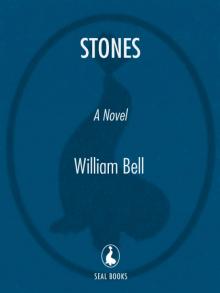 Stones
Stones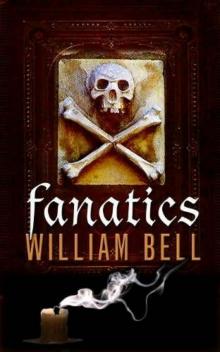 Fanatics
Fanatics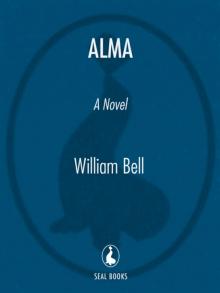 Alma
Alma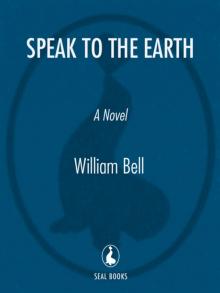 Speak to the Earth
Speak to the Earth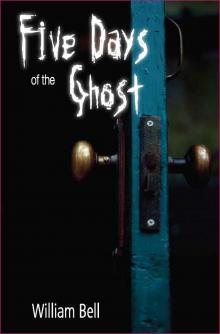 Five Days of the Ghost
Five Days of the Ghost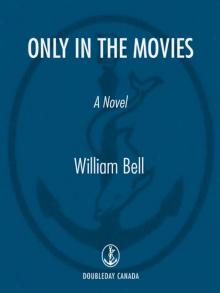 Only in the Movies
Only in the Movies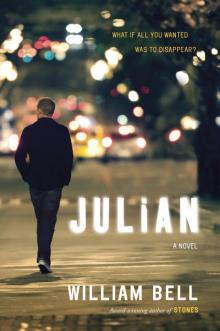 Julian
Julian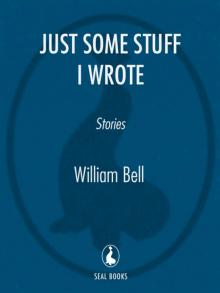 Just Some Stuff I Wrote
Just Some Stuff I Wrote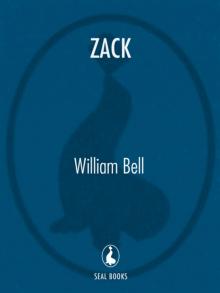 Zack
Zack Forbidden City
Forbidden City Death Wind
Death Wind No Signature
No Signature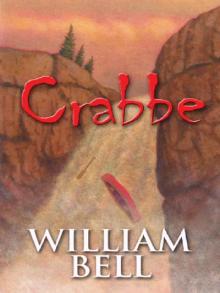 Crabbe
Crabbe